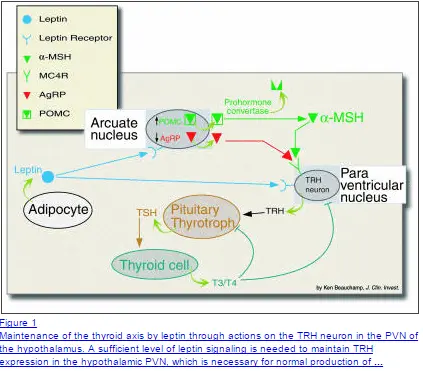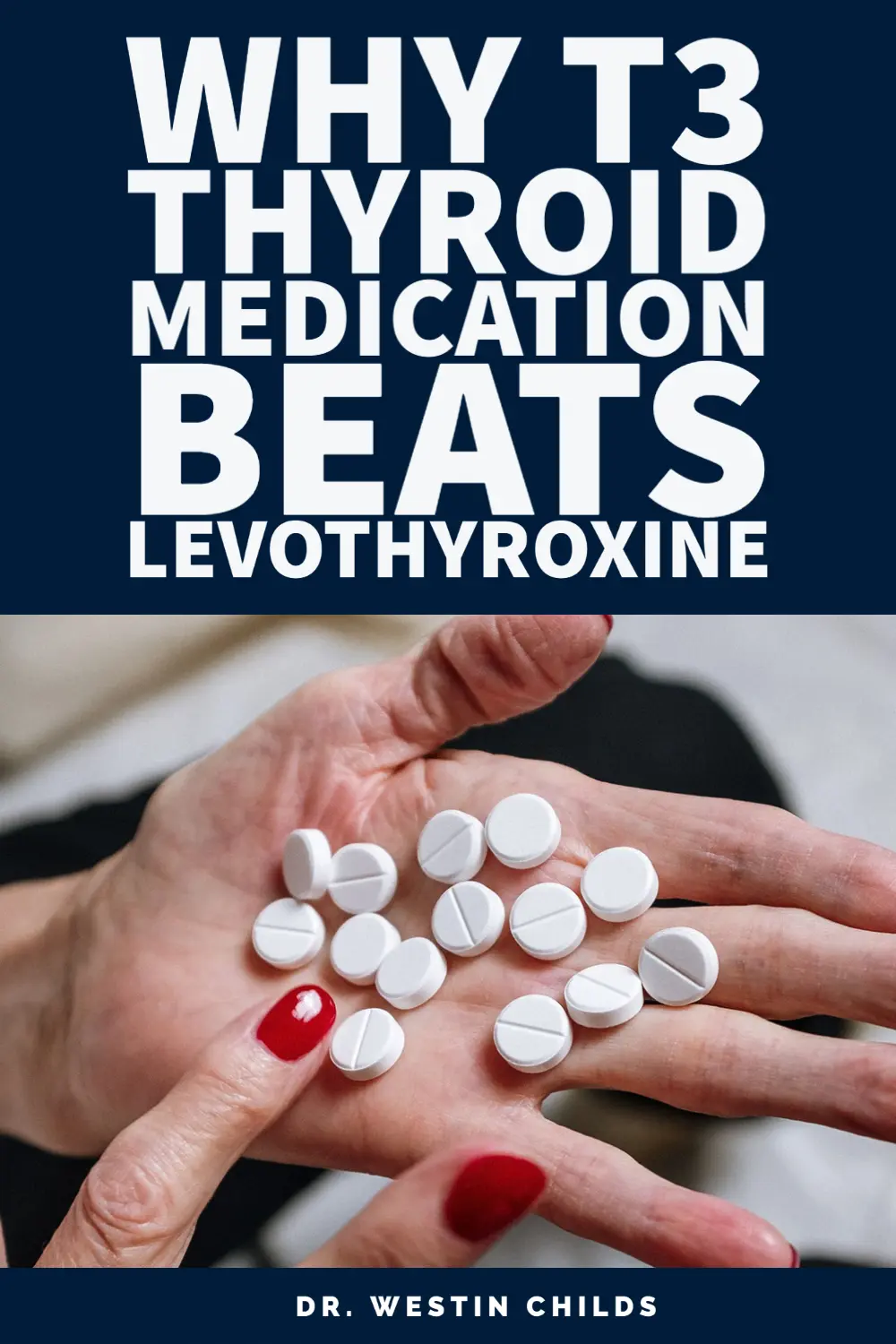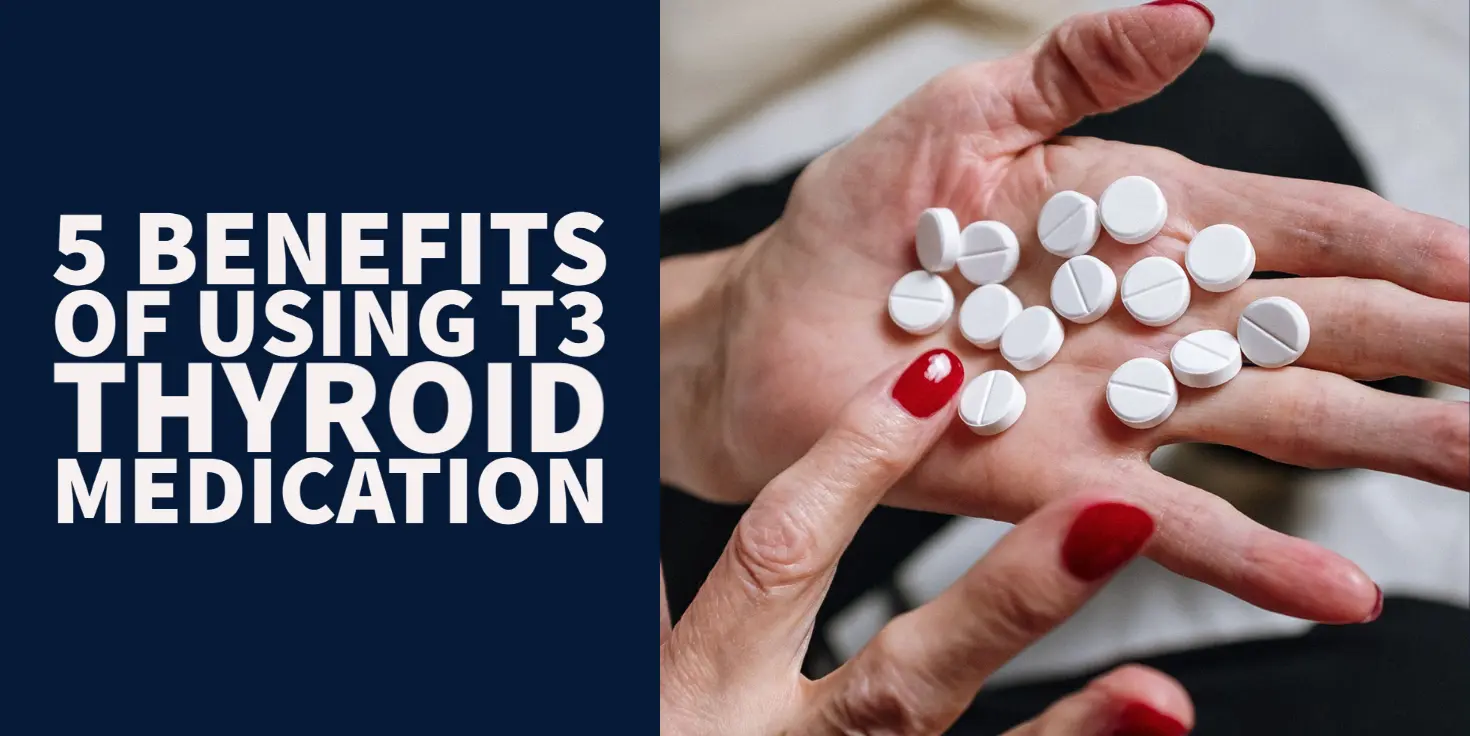Many patients on levothyroxine or Synthroid stand to benefit by simply adding a small amount of T3 medication to their regimen.
T3 is metabolized in the body in a different way than T4 which makes it special.
It’s also the strongest and most powerful of all the thyroid medications but it must be used correctly.
Learn about the benefits of T3 including which patients should use T3 and why in this post:
What is T3 Thyroid Medication?
T3 thyroid medication is the strongest of all thyroid medications.
Why?
Because T3 is the active thyroid.
But most patients with hypothyroidism are not taking T3 thyroid medication.
How come?
Despite the medication being quite safe if used correctly, many physicians simply aren’t comfortable with prescribing it.
As a result, most patients are taking some form of T4 thyroid hormone.
You know these medications well: levothyroxine, Synthroid, and Tirosint.
All of these medications fall into the class of T4 thyroid medications.
And, unfortunately, they are considered to be weaker when compared to pure T3.
T4 thyroid hormone must be activated in your body through special enzymes.
When it is activated your body changes its structure and turns T4 into T3.
Once it’s in the T3 form it can then get into your cells and activate genetic transcription through its action on nuclear receptors.
But your body can also inactivate T4 by turning it into reverse T3.
And this is one of the reasons that using T3 thyroid hormone is so special.
Instead of providing you with a medication that your body must activate, you can instead bypass this activation process and provide the body with the direct and active thyroid hormone (T3).
Is using T3 actually dangerous as most physicians would have you think?
It turns out that, as long as it is used correctly, there are very few side effects of using T3.
More and more physicians are starting to add T3 to existing doses of T4.
This might come in a combination such as levothyroxine + Cytomel (usually in small doses).
But T3 can be used much more effectively, and safely, at even higher doses.
In fact, most patients stand to benefit tremendously by adding a small amount of T3 to their existing dose of T4, even if it means lowering their current dose of T4.
T3 can also be safely combined with natural desiccated thyroid hormone (you can read case studies here).
But the question remains:
Who should consider using T3?
- Bottom line: T3 is the strongest form of thyroid hormone and can be prescribed by your doctor. Certain patients stand to benefit by adding doses of T3 to their existing T4 dose. Unlike T4 thyroid hormone, T3 does not require activation to exert its effects on the body.
DOWNLOAD FREE RESOURCES
Foods to Avoid if you Have Thyroid Problems:
I’ve found that these 10 foods cause the most problems for thyroid patients. Learn which foods you should avoid if you have thyroid disease of any type.
The Complete List of Thyroid Lab tests:
The list includes optimal ranges, normal ranges, and the complete list of tests you need to diagnose and manage thyroid disease correctly!
When to use T3 thyroid medication
Determining if you would benefit from T3 thyroid hormone is not as difficult as you might think.
As a general rule of thumb:
The more medical conditions you have, the more excess body fat you have, the more medications you are on, and the more inflammation in your body… the more likely you are to benefit from T3.
Why?
Because all of these conditions create an environment inside of your body that favors the production of reverse T3 over T3.
That means you are in a state of thyroid resistance.
In a nutshell, your body is basically blocking the action of thyroid hormone at the cellular level, this can occur even though you have “enough” thyroid hormone floating around in your bloodstream.
When it comes to thyroid hormone we really don’t care how much is floating around in your blood, we really only care if thyroid hormone is getting inside your cells and turning on your genes.
But we don’t have a great way to test for this, so instead, we use surrogate markers such as reverse T3 and sex hormone-binding globulin.
Most patients who stand to benefit from using T3 thyroid hormone fall into one or more of the following categories:
- Hypothyroid symptoms despite having a “normal” TSH or normal thyroid blood levels (see the complete list of symptoms here)
- Difficulty of weight loss or inability to lose weight (read more about how T3 influences weight here)
- Low serum levels of free T3 via lab testing despite having a “normal” TSH
- High levels of reverse T3 on lab testing
- History of insulin resistance or high blood sugar
- History of leptin resistance (or fasting leptin level greater than 10)
- Continued fatigue despite taking thyroid medication
- Failure to improve even while taking natural desiccated thyroid hormone (like Armour Thyroid, WP Thyroid, NP Thyroid, and Nature-throid)
- History of bipolar disorder or treatment-resistant depression
- History of chronic pain/fibromyalgia
While this list isn’t exhaustive, it does include the majority of patients who might benefit from the addition of T3.
It’s also important to consider T3 therapy (either in addition to your current dose of T4 or NDT) if you are having any issues or remaining symptomatic despite taking thyroid medication.
This might manifest as intolerance or sensitivity to thyroid medication, or an inability to absorb your thyroid medication.
Benefits of Using T3 Thyroid Medication:
Because of the unique way that T3 is utilized in the body when compared to T4 it comes with several benefits that we should talk about.
These benefits have to do with the fact that this medication does NOT require an activation step in the body, which means that it is active once it is absorbed.
#1. More Weight Loss
Another VERY important aspect of T3 is its ability to influence weight loss.
So does T3 help with weight loss?
The answer is a resounding yes!
In fact, this effect is much more pronounced than T4 and/or NDT.
Why does T3 help with weight loss more than T4?
T3 has a greater action on the factors that influence your metabolism than T4 does.
Studies have shown that patients taking suppressive doses of T4 thyroid hormone, resulting in a low or “suppressed” TSH still have a lower metabolism than what would be expected (1).
Obviously, a low metabolism would result in an inability to lose weight and this might explain why so many hypothyroid patients have issues with weight loss despite taking thyroid hormone.
In addition, other studies have shown that patients with “normal” TSH levels tend to have lower levels of both free T3 and free T4 (2) compared to age-matched controls.
This reduction in thyroid levels may help explain the difference in weight among hypothyroid patients and euthyroid patients.
Basically, your free T3 and free T4 levels seem to matter much more than your TSH when determining how you will feel when taking thyroid medication.
And lastly, other studies have indeed confirmed that patients who take T3 thyroid hormone over T4 show that they have more weight loss (3) and a higher metabolism WITHOUT negative side effects.
This doesn’t necessarily mean that everyone will benefit in this way from T3 but it does mean that using T3 should be a serious option for patients who are not tolerating T4-only thyroid medication (or NDT).
#2. Higher Basal Metabolic Rate
Another benefit of T3 medication is that it increases (or normalizes) your basal metabolic rate.
Hypothyroid patients are very susceptible to having a lower-than-normal metabolism for a variety of reasons.
First:
Having low thyroid itself changes your metabolism and will lower it. This is one of the main reasons that weight gain is a symptom of hypothyroidism.
Second:
The second reason is also very common and more sinister than the first.
Because hypothyroid patients tend to gain weight these same patients usually undergo calorie-restricted weight loss programs to try and lose weight.
Unfortunately, calorie restriction actually makes the problem even worse by further lowering the metabolism (4).
The combination of low thyroid hormone plus metabolic damage from calorie restriction results in a metabolism that is usually in the range of 1,200 to 1,500 calories burned per day.
This is why many hypothyroid patients have difficulty with weight loss and why Doctors look at you like you’re crazy when you tell them that you’re eating 1,000 calories per day and still not losing weight.
The benefit of using T3 is that it can help heal your metabolism and increase your basal metabolic rate through its influence on your mitochondria.
#3. Reduction in Hypothyroid Symptoms
Another benefit of using T3 is that many of your true hypothyroid symptoms will likely improve or be reduced dramatically.
I’m talking about hair loss, fatigue, weight gain, brain fog, etc.
These symptoms are all indicative of low tissue levels of thyroid hormone and many of these symptoms persist even while taking thyroid medication like T4.
But once you start taking T3 thyroid hormone your body is able to take up the T3 and use it at the cellular level.
This results in greater tissue levels of thyroid hormone in your skeletal muscle (increasing metabolism and energy), your hair follicles (reducing hair loss), and your brain tissue (reducing depression and brain fog).
While it is true that other factors like nutrient deficiencies may contribute to your symptoms, it’s easier to distinguish the cause of these issues when you start taking T3.
#4. Higher Body Temperature
Through its influence on energy production in your mitochondria, T3 can actually help to increase or normalize your body temperature.
Your total body temperature is a reflection of the amount of energy you are producing and the amount of energy you are burning.
Many patients walk around with very low body temperatures (in the 95-96 degree range) as a consequence of hypothyroidism.
This low body temperature is almost always associated with a slower metabolism and a low basal metabolic rate.
T3 thyroid hormone helps improve your body temperature in several ways:
First:
It directly mediates energy production in your mitochondria (this helps boost your metabolism).
Second:
T3 helps the body burn fat tissue and activate brown fat to further increase metabolism and increase fat burn (5).
The addition of T3 helps to normalize these processes and can increase your body temperature to normal levels (and help increase your metabolism in the process).
#5. Improvement in Other Hormone Imbalances
One of the main reasons that thyroid patients DON’T get better when starting thyroid hormone is due to its effects on other hormones in your body.
Hypothyroidism helps potentiate two very important hormone imbalances:
Insulin resistance and leptin resistance.
Unfortunately, using T4 thyroid hormone can help reduce the symptoms of hypothyroidism but it won’t necessarily treat these hormone imbalances if they are present.
That is where T3 comes in handy.
T3 has been shown to help reduce insulin resistance (6) (which will help with weight loss and help normalize blood sugar).

T3 has also been shown to help reduce leptin resistance (7).
This is very important because there are currently very few treatments that can help lower leptin levels.
If you aren’t aware, leptin resistance creates an environment in your body that makes weight loss almost impossible unless it is reversed.
NDT vs pure T3
What about natural desiccated thyroid hormone?
NDT is another form of thyroid hormone replacement and NDT does contain some amount of T3 in it.
1 grain of NDT contains about 38 mcg of T4 thyroid hormone and 9mcg of T3 thyroid hormone.
It also contains some other less biologically active thyroid hormones like T2.
NDT is another great thyroid hormone replacement medication but just like T4 medication, it does fall short in certain circumstances.
Because NDT is mostly T4 (about 80%) it is still subject to reverse T3 conversion and might cause issues in some patients.
In addition, certain patients may need temporary supraphysiologic doses of T3 for short periods of time to wash out the reverse T3 and reset the system.
Using higher doses of T3 during this time period or using the combination of T3 and NDT together can help overcome this issue.
It’s best to consider NDT as another potentially helpful medication, but it shouldn’t be considered the “best” thyroid medication.
SR T3 vs IR T3
T3 medication comes in two varieties:
- Immediate release T3 <— Including medications like Cytomel and Liothyronine
- Sustained released T3 <— This is a compounded medication of liothyronine (usually bound to methylcellulose)
It’s important to realize that these medications are the same in that they both contain T3 thyroid medication.
How they differ is in how quickly they are absorbed into your body.
Immediate release T3 is absorbed rapidly into the body and peaks in the serum within 2-3 hours usually.
Patients who are sensitive to T3 may develop heart palpitations or a jittery sensation around this time.
These side effects occur as a result of this rapid absorption and the sensitivity of cardiac myocytes to T3.

In your heart, T3 has a direct action on the calcium channels which causes the heart to pump harder and faster (which may lead to heart palpitations).
This is compared to other systems in the body where T3 has to directly interact with the nucleus and results in changes to genetic transcription (this process often takes weeks).
If you fall into this “sensitive” category and you are experiencing these side effects of IR T3 (heart palpitations, etc.) then in most cases simply switching from cytomel to SR T3 is enough to fix the problem.
In SR T3 formulations of T3 medication, the T3 is bound to a glue-like substance (usually methylcellulose) which delays the absorption.
This allows your body to slowly absorb T3 throughout the day and will limit the “flood” of T3 that is seen 2-3 hours after taking IR T3.
Whenever possible my general preference is to use IR T3 over SR T3, but that isn’t always possible.
Another limiting factor that should be considered is that Cytomel and generic liothyronine both contain inactive fillers.
In some cases, patients may react to these inactive ingredients necessitating a switch from IR T3 to SR T3.
In most cases (probably approaching 70% of patients), however, patients tolerate IR formulations of T3 such as Cytomel and Liothyronine quite well.
Side effects of T3 to watch out for
The side effects of T3 come from taking too much of the medication or from inactive ingredients.
As long as you dose the medication correctly and use the proper type of T3 medication (IR vs SR T3) there are generally very few issues.
Occasionally patients may present with the following symptoms when taking T3:
- Heart palpitations
- Jittery sensation
- Increased anxiety
- Hot flashes or feelings of being warm or too hot
- Temporary increase in hair loss
- Headaches
These would be considered less serious side effects of taking T3.
If you experience any further side effects not listed here it’s best to consult with your prescribing physician.
I do want to focus on a couple of these side effects for a moment…
First is hair loss.
T3 can absolutely cause a significant but temporary increase in hair loss.
This is worth mentioning because hair IS a symptom of hypothyroidism and this side effect may be confused with worsening symptoms when in reality the opposite is true.
Remember that this hair loss is temporary and usually subsides within 2-3 months.
The next is headaches.
Unfortunately, some patients experience headaches when starting T3.
If this happens to you the best option is to consider switching to SR T3.
Back to you
T3 thyroid medication is quite powerful and safe if used correctly.
Using T3 comes with special benefits due to how the body metabolizes and uses thyroid hormones.
In some cases, patients may require T3 in addition to their current thyroid medication (like T4 or NDT).
Most patients who stand to benefit from T3 are patients who have not felt better on other thyroid medications or patients with extreme weight loss resistance.
Use the outline above to determine if T3 might be helpful for you.
Now I want to hear from you:
Is T3 helping you with weight loss?
Is it helping you increase your body temperature or reduce the symptoms of hypothyroidism?
Why or why not?
Leave your comments below!








